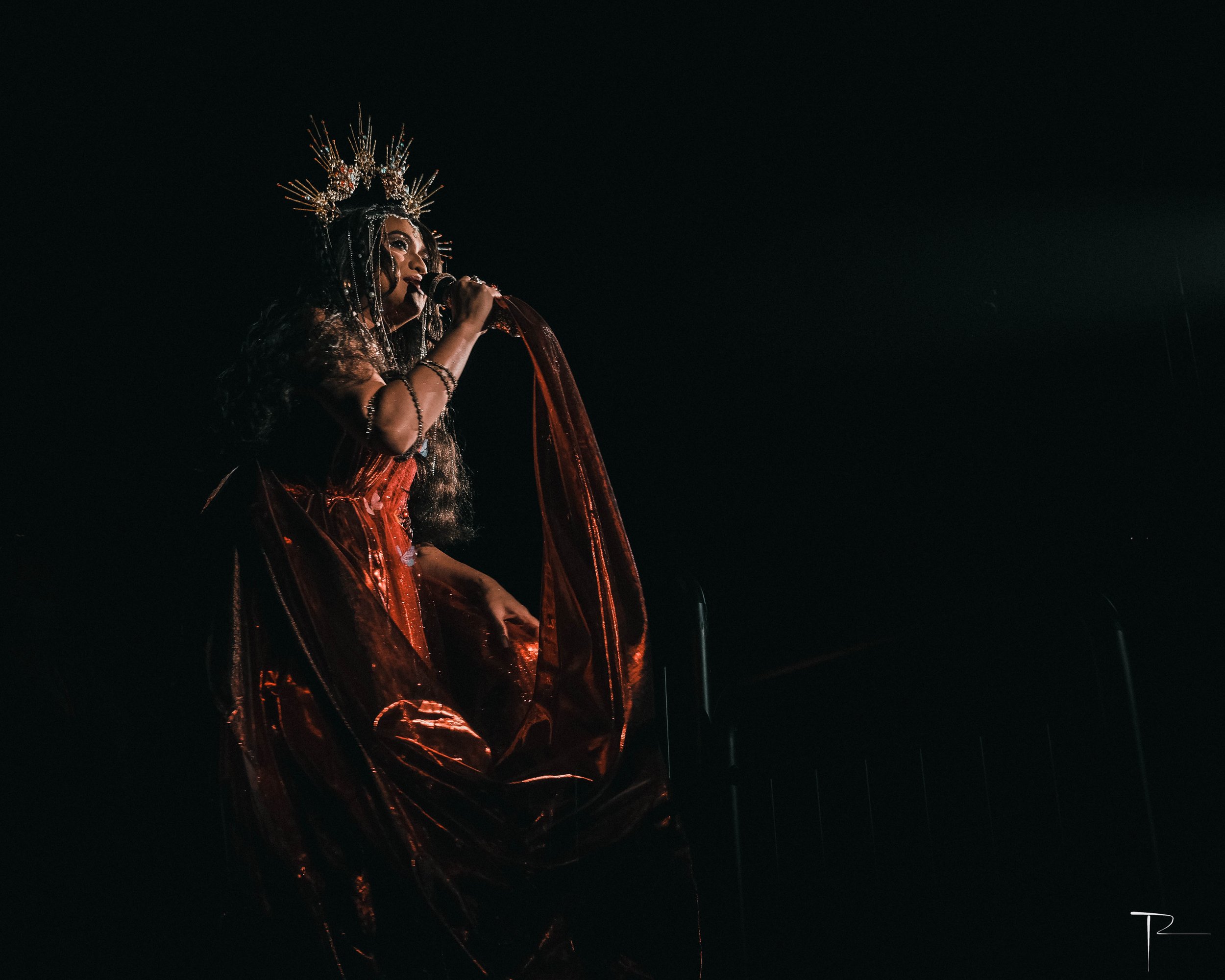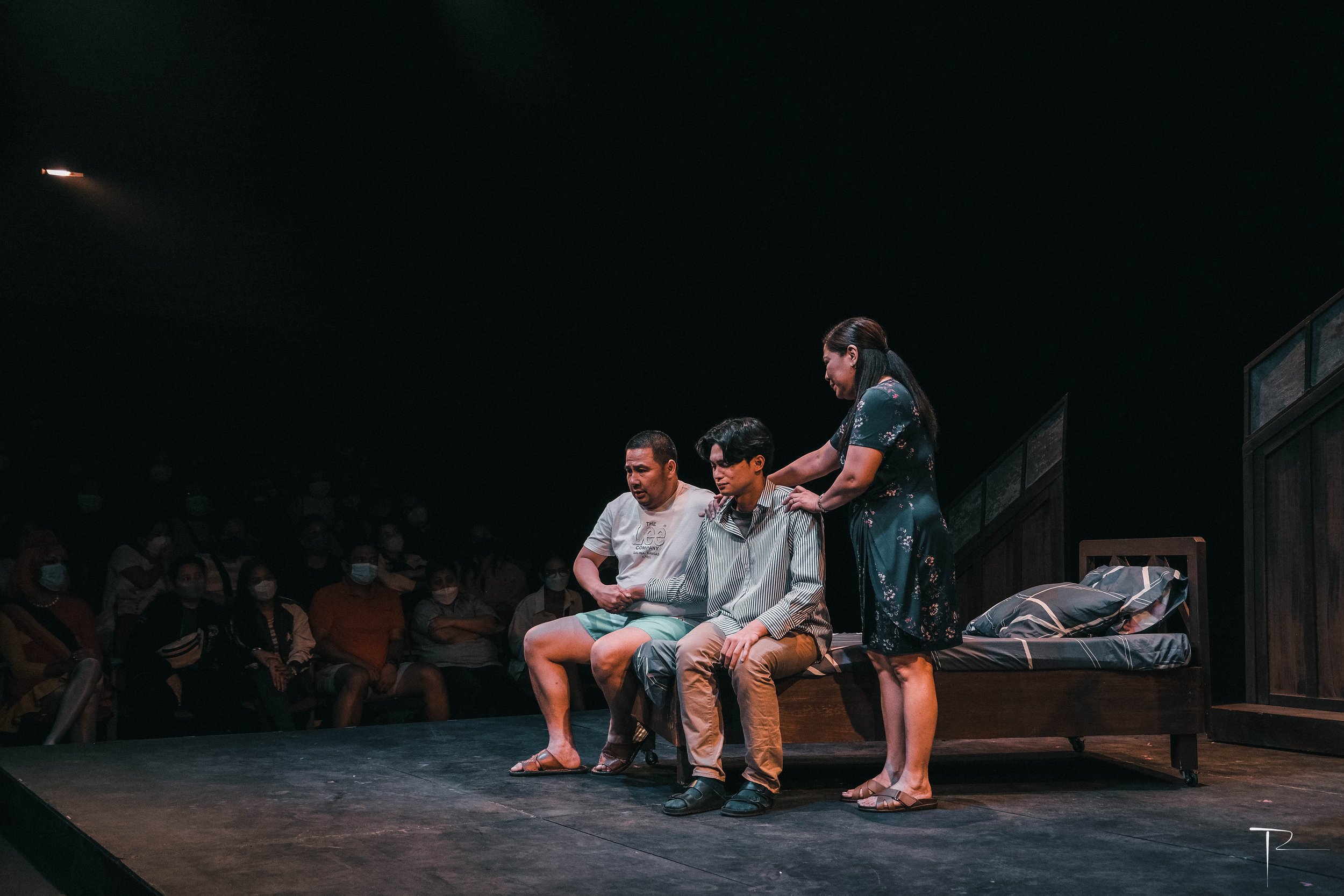Virgin Lab Fest - Set A tackles Adulting, Accountability, and Agency
This eighteenth year of the Virgin Lab Fest sees twelve virginal one-act plays running from June 7 to 25, 2023. With the overarching theme of “HITIK”, or being filled to the brim, the annual festival presents its most recent cohort of untested plays through a tasting platter of four thematic sets: Adulting 101 (Set A), REBELasyon (Set B), Y.O.L.O. (Set C), and Muwang (Set D).
Written by Rommielle T. Morada
Photos provided by Riki Benedicto from His Royal Yumminess Studios
June 26, 2023
Astrid (Aryn Cristobal) and Oliver (Juan Carlos Galano) in “O”
It’s the opening set, however, that works to inform the tone for the rest of the festival. Surprisingly, though one would be inclined to assume coming-of-age vignettes to come from a set entitled “Adulting 101,” the three plays choose to look beyond the blinding optimism often brandished by bright-eyed fresh grads with the world in the palm of their hands. Instead, each play centers around twenty-to-thirty-somethings dealing with the messiness of adulthood, specifically having to navigate relationships so informed by challenges to one’s agency and accountability, inside and outside of one’s own body. No one really knows what they’re doing, but no one wants to end up alone.
10 to Midnight
Juliene Mendoza’s 10 to Midnight, directed by Sarah Facuri, follows a non-conversation conversation between brothers Bien (Bombi Plata) and Billy (Jerome Dawis) just as the latter finishes setting up a garage sale. Bien, estranged and rendered monetarily dependent on his younger brother, is a picture almost all Filipino families are familiar with — struggling with his alcoholism, Bien is unable to find employment or even the motivation to retain employment despite being an able-bodied college graduate. Naturally, this becomes the root of the tension within their relationship, as even when Billy denies that Bien’s alcoholism is a disease, it is the same thing that renders their brotherhood fatally weakened.
Bien (Bombi Plata) and Billy (Jerome Dawis) in “10 to Midnight”
The audience, however, gets the idea that this non-conversation conversation isn’t anything new, with much of their arguments going in circles. Billy, tired of having to stay accountable for his Kuya, is frustrated beyond belief and struggles to see past his own resentment, for both his brother and himself. There’s the lingering question of just how far being your brother’s keeper can take you and what dimensions of “keeping” actually count in adulthood. When Bien remembers his brother’s birthday and states, even in tattered clothes, that Billy is his responsibility, Billy cannot help but attempt to grasp at straws for a functional relationship.
Bien, of course, cannot provide this. Just before the two brothers leave the stage, Bien attempts to take another secret swig and reconciles with the knowledge that his most basic tendency is to disappoint the people he loves.
O
The big “O”, as they call it, is at the center of Raymund Barcelon’s aptly titled vignette. Directed by Missy Maramara, it opens with a raunchy, backlit montage of different intimate positions, complete with an exposed behind. The lights come up as Astrid (Aryn Cristobal) wails in ecstasy: “I think we should break up!” right before her fiance Oliver (Juan Carlos Galano) finishes.
Hilariously traumatized, Oliver finds out that Astrid wants to split because she’d never orgasmed with him — or with any of her exes, for that matter. Despite Astrid’s unease when approaching the topic of her sexuality, Galano’s portrayal of Oliver’s amusing ignorance keeps the tone light and endears Oliver to the audience even as he is pushing for an outcome that goes directly against what Astrid wants for herself.
Exploring the internalization of sexual politics, Astrid is the portrait of a restricted woman, keeping guard of her own desires, socialized to avoid being sexualized. The conversation between them — comically set in a motel Oliver himself is embarrassed about — goes beyond the satisfaction of the female sex and into the implications of marriage for a woman, who becomes dependent on her husband’s pleasure and, on a larger scale, his happiness.
As endearing as Oliver is portrayed to be, ultimately he figures that Astrid’s lack of an orgasm is something that was done to her by another man, something he can thus undo. Stripping her of agency over her own pleasure, Astrid’s escape from the motel room calls into question whether or not she’ll be able to be open enough about her sexuality to be able to resolve the matter.
Regine: The Fairy Gaymother
Closing the set is Chuck D. Smith’s Regine: The Fairy Gaymother. Directed by Mark Daniel Dalacat, the play surrounds Diego as his mother urges him to come out of the closet, leading to the arrival of his family’s idol, the patron saint of all young Filipino gay men, and his own fairy gaymother, “freaking Regine Velasquez!”
Littered with pop culture references magnificently delivered by Anton Diva’s Regine, the play’s absurdity is its best asset at hand. One would even be inclined to describe it as a young vaklush’s mental breakdown. Even the stagehands responsible for moving set pieces to transport us to different parts of the family’s house are dressed in tiny fairy wings as the omniscient Regine’s minions. Meanwhile, Ron Capinding and Tex Ordoñez-De Leon’s comedically sexualized relationship as Diego’s parents not only provides comedic relief but outrightly juxtaposes their son’s lack of interest in being open about his sexuality and his relationships. As funny as their scene-stealing exchanges are, ultimately, both of Diego’s parents have to reckon with whether or not their love for their son is as unconditional as they would like it to be.
At the heart of it all is Adrian Lindayag’s empathetic portrayal of Diego, as he defends his choice to stay closeted. With Pride Month coming to a close, we are left to reconcile how often gay narratives are trivialized and made consumable for wider audiences, with coming out stories themselves almost serving to brand one person with their entire sexuality. With the little avenues left for the LGBTQ community to reclaim their agency, the play reckons with the nuances that the act of coming out is laden with, in terms of fleshing out a young gay man’s identity. As Diego admits: “I don’t want to come out like I’m confessing a crime because I’m not. I want to come out when I feel safe.”
Entries to VLF 18: HITIK will be staged at The Tanghalang Ignacio Gimenez (CCP Blackbox Theater). The performing arts festival will run from June 7 to 25, 2023.







